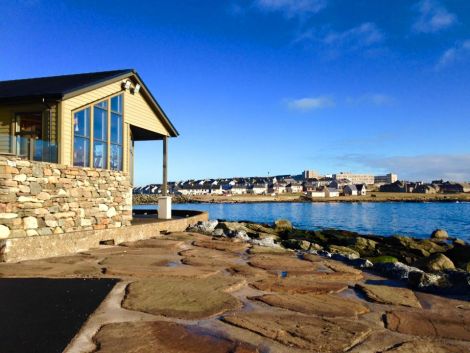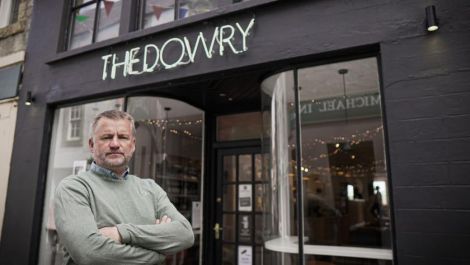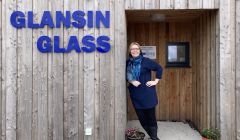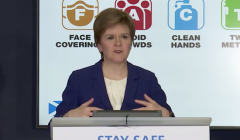Coronavirus / Stringent new hospitality restrictions announced to prevent another lockdown
Cafes limited to 6am-6pm opening; indoor alcohol sales banned
HOSPITALITY businesses in the islands are facing up to stringent new restrictions for the duration of the October school holidays as the Scottish Government strives to bring the spread of Covid-19 infections under control.
Scotland’s First Minister Nicola Sturgeon announced that alcohol sales will be prohibited and bars, restaurants and cafes serving food and non-alcoholic drinks can only open from 6am-6pm from teatime on Friday until Sunday 25 October. Hotel restaurants can stay open later but only to serve residents.
There has been speculation for weeks about a clampdown on hospitality. Cases in Scotland rose above 1,000 on Wednesday and Sturgeon warned that if the current growth continues there could be a return to pandemic levels seen back in the spring.
Locally there has been concern across the board about what the measures might mean for hospitality businesses already struggling and facing up to a winter without the normal Christmas party season or boosts in trade normally brought by Shetland Wool Week and Up-Helly Aa.
Sturgeon herself noted that the Shetland and Orkney health board areas were exceptions to a nationwide pattern of rising infections.
After a spate of infections early in the pandemic, Shetland has seen only a small handful of cases in recent months and some have expressed frustration that local businesses will now suffer as a result of rising cases in the central belt.
The Dowry’s managing director Stuart Fox said the popular Lerwick eatery would look to offer breakfast from 9am and a nighttime takeaway service in response to the latest restrictions.
The café was fully booked this Friday and Saturday but instead will be shutting its doors at 6pm. Fox fears The Dowry could lose up to 50 per cent of its projected income during the October school holidays.
“Weekends at nights is where we make our money, and we’ve been robbed of the next three weekends,” he said.
Become a member of Shetland News
He hoped Shetland might be exempt from some of the restrictions and feels prohibiting people from enjoying a civilised glass of wine or a beer “almost makes a mockery of licensing laws”.
A Scotland-wide funding package of £40 million is being put in place, and Sturgeon said the government would consult the industry in the next day or so about how best to distribute that money.
Fox and Shetland MSP Beatrice Wishart both said it was uncertain whether that sum would stretch far enough to cover every business that needed support.
Wishart said the interest had “already been dealt blow after blow, and the positives seem few and far between”.
Jonathan Williamson, manager of the bustling Fjara café-bar on the other side of town, is remaining philosophical and upbeat.
Fjara already opens for business at 8am and Williamson said he would now look to serve food until 5pm.
“We’ve heard rumours for weeks, so I was expecting some sort of restriction, and this is better than a lockdown,” he said.
“It’s going to have an effect on business but it’s [not something] where we can’t weather the storm. I’m lucky enough to be busy for breakfast trade, lunchtime trade and usually nighttime as well, but it’s only for a couple of weeks right now.”
The Federation of Small Businesses’ Highlands and Islands development manager David Richardson said hospitality businesses would be “dismayed” by the announcement.
“With some three months’ trading under their belts since unlocking, squeezing every last penny out of the season has been of paramount importance to their long-term viability, and now they are seeing what for many will be the premature ending of the 2020 tourist season,” he said.
Shetland Islands Council leader Steven Coutts said he welcomed that the SNP government had accepted the principle of local variation – the hospitality sector in the worst-affected central belt health board regions faces a fuller shutdown.
But ultimately businesses here will be affected despite very low incidence of Covid-19 and Coutts vowed to continue pushing both for a more localised approach and the opportunity for local authorities to have input prior to subsequent announcements.
It has been a “very, very difficult year” for hospitality already and “clearly this restriction on openings… is going to have a really damaging impact on those businesses”.
Coutts added: “Clearly there is a divergence of Covid-19 spread throughout the country and that’s demonstrated by increased restrictions in hospitality in the central belt and the evidence suggests that’s necessary, but I would like some evidence at a Shetland level that these are necessary.”
Meanwhile Liberal Democrat MSP Wishart said there did appear to be “a growing recognition that there may be a cautious case to be made for the islands to go their own way. As it stands though, that option still just seems to be ‘on the table’.”
She urged the Scottish Government to make the decision-making process behind the restrictions “as public as possible” so it can “enjoy the confidence of Shetlanders throughout the remainder of this pandemic”.
“That said, I recognise that finding the right balance on restrictions is extremely challenging. I hope Shetlanders will step up to the task once again and follow the rules that have been set out so that we can keep the levels low.”
The 16-day period during which the measures will be in effect coincide with the October school holidays “when perhaps more people might be going out – I get why it’s being done to stop the interaction between households, but it is very hard on hospitality businesses”, Wishart said.
She and other islands MSPs met health secretary Jeanne Freeman last week to discuss the possibility of localised variations and “they’re not closed to the idea of doing something different for the islands, [but] whether that time is now remains to be seen”.
Wishart said there appeared to be mixed views among constituents. Because the UK – which recorded over 14,000 infection for the second successive day – is around four weeks behind France and six weeks behind Spain in terms of the second wave of Covid-19, with hospital admissions now rising steadily, “I do feel more cautious at this precise moment”.
NHS Shetland chief executive Michael Dickson described Sturgeon’s announcement as “a precautionary response that acknowledges we have a different picture throughout the country”.
Accepting that some islanders will be frustrated, he again pointed to the Western Isles as an example of how things can change. Its recorded cases rose from 10 to 53 in little over a week, which “shows how quickly and easily this virus can spread”.
“I understand some people might be asking for a different message for Shetland, but what is being proposed is a proportionate response to the challenge the whole of Scotland is facing,” Dickson said.
“Everyone might not grasp the complexity of the epidemiology and the reasons why public health decisions are made in the way they are, which is why we’ve got a dedicated public health team that have guided the [local] response to the pandemic.
“Realistically we are as an island where we are because the public have been amazing, they have been utterly astonishing.”
Become a member of Shetland News
Shetland News is asking its many readers to consider paying for membership to get additional features and services: -
- Remove non-local ads;
- Bookmark posts to read later;
- Exclusive curated weekly newsletter;
- Hide membership messages;
- Comments open for discussion.
If you appreciate what we do and feel strongly about impartial local journalism, then please become a member of Shetland News by either making a single payment, or setting up a monthly, quarterly or yearly subscription.



















































































